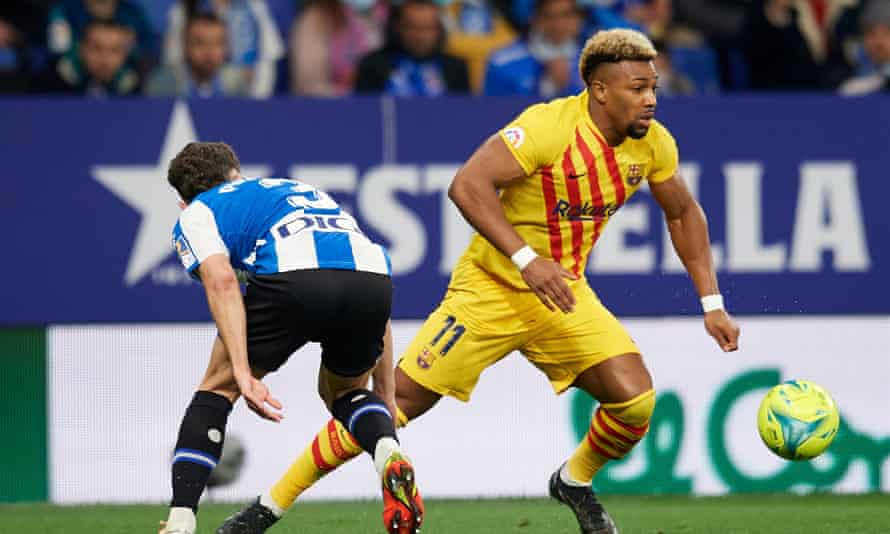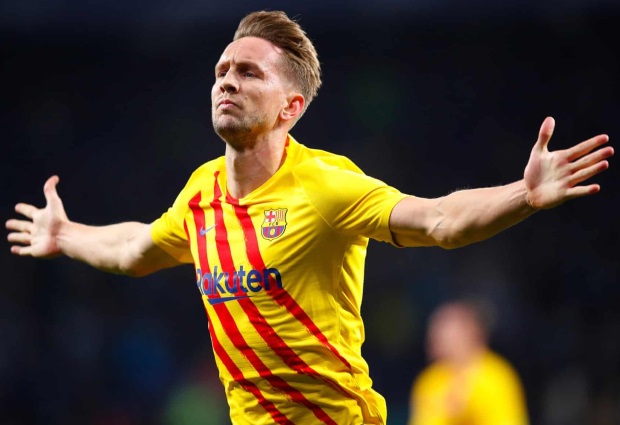Nico González had in his hand a piece of paper. Time was running out and unless they could do something about this – and fast – Barcelona were going to lose a Catalan derby
at Cornellá for the first time in La Liga. It had taken them only 73 seconds to score one, but in 73 minutes they hadn’t got a second. Worse, Espanyol had. Sergi Darder curled in a gorgeous equaliser and then Raúl de Tomás put them ahead, meditating cross-legged on the grass ignoring the madness all around him. Xavi Hernández, though, had a plan, written down and sent by special delivery.
Trouble was, writing it was one thing, reading it another. And actually getting it to come off, well, that was a step again. Pierre-Emerick Aubameyang had already replaced Frenkie de Jong. There were 18 minutes left when Nico and Ousmane Dembélé replaced Gavi and Jordi Alba. It was 25 days since Dembélé had been given an ultimatum: renew or leave; needed now, the man who was never going to play again ran back on at his club’s city rivals, where a reception less hostile than at home awaited him. Alongside, the kid from the academy came too.
Nico dashed over and gave the sheet torn from Xavi’s exercise book to Sergio Busquets, who turned to Gerard Piqué. This was a lot to take in – a back three, Sergiño Dest to the left, four up front, Ferran returning to the middle – and they looked a little lost, rotating the paper like a map that was upside down or instructions for an Ikea wardrobe, a pair of Homer Simpsons wondering out what the hell le grille is. They could have been forgiven for wanting to simplify it all, concluding: why don’t we just stick it in the box for the big guy? Which was pretty much what they did in the end.
The very end, the goal that rescued them coming in the 96th minute when Luuk de Jong headed in the equaliser.
But that was then and this was now and for now that idea wasn’t really possible, which didn’t stop them trying. There was a piece missing, it seemed, when it had been right there all along, just been overlooked. And there’s that wardrobe again, this metaphor murdered. A piece no one thought mattered but which turned out to be vital when it appeared, everything finally making sense after all that sweat and swearing. Time kept slipping away, crosses too, but Barcelona were not really getting any closer, on course for a first defeat in 10.
Adama Traoré spent the night brushing off opponents
Espanyol, on the other hand, were. A night that had started with fireworks welcoming the bus was ending in celebration, their coach Vicente Moreno proven right. “I can see it in Raúl’s eyes; he’s going to score, to pull that thorn from his side,” he had said. R dot D dot T dot who had hit the post when Espanyol unluckily lost against Barcelona on Xavi’s managerial debut, had scored his 13th, 45% of all their goals, and they were 2-1 up heading towards added time. They had not won the derby in 13 years and hadn’t ever won one at the stadium that was supposed to change everything. Twenty-three games they had gone without defeating Barcelona, who sent them down to Segunda in 2020. That was already the joint longest run of any derby in Spain, after Atlético Madrid broke 14 years of failure against Real, but at least they weren’t going to hold the record alone.
No wonder the place was going wild, songs belted out. The moments when they had been at their best, opponents bouncing off Adama Traoré when they weren’t hanging off him like he was Jonah Lomu and they were a family of Underwoods, Barcelona hadn’t taken advantage. Now that they had to chase, they had made few real chances and were struggling to find a way through, heading for a first defeat in nine.
But on 88.04, Xavi sent on Luuk De Jong, going to five forwards and mostly going to one of them. Well, two: out to Adama, in to De Jong. “It was a bit strange; there were a lot of attackers,” Aubameyang admitted, but it paid off. On 90.30 De Jong headed just off target, sinking to his knees. On 91.44 Piqué, who had mostly smiled at the stands, was sent off after a confrontation with Nico Melamed. On 93.01 RdotDdotTdot hit a 70-yard shot that was never going to go in but didn’t matter because booting the ball away would do. On 93.47, De Jong ran off to get a ball that no one else would. And on 94.55, Hernández Hernández, the referee so good they named him twice, who had given six minutes extra, raised a finger to signal one more.
They didn’t need it. On 95.40, Adama swung in a deep cross. From near the penalty spot, De Jong jumped between three men and thudded a header down and into the net. Arms wide, he ran to the corner, leaving the goalkeeper Diego López lying here, defeated. Only 15 more seconds were played. He had rescued them.
“We’re very annoyed,” López said afterwards. “We did enough to have won,” Moreno said. The manager, Darder had admitted, has a line he uses a lot: every game hangs by a thread. At the last, the rope was cut. “This can’t happen; the game can’t escape us on 90 plus,” Darder said. “It can’t be that Barcelona put so many crosses in; that they put a cross over in the 95th minute.”
Countercultural, not a natural fit for Xavi, Barcelona and Sevilla, the club that own him, reached an agreement to send him out on loan to Cádiz in January. He was told he was not part of Barcelona’s plans. De Jong, though, wanted to stay. He had just had a child and thought he could be useful, so he stayed and he was. He has scored four in the past five games: the only goal against Mallorca, when he started because Covid meant there was no one else; the opener against Granada; and now this late equaliser in the derby. Barcelona are in a Champions League place. Without those goals they would be ninth.
















